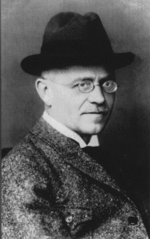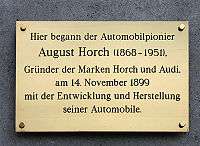August Horch
| August Horch | |
|---|---|
 | |
| Born |
12 October 1868 Winningen, Rhenish Prussia |
| Died |
3 February 1951 (aged 82) Münchberg, Bavaria |
| Known for | Founder of Audi |


August Horch (12 October 1868 – 3 February 1951) was a German engineer and automobile pioneer, the founder of the manufacturing giant which would eventually become Audi.
Beginnings
Horch was born in Winningen, Rhenish Prussia. His initial trade was as a blacksmith, and then was educated at Hochschule Mittweida (Mittweida Technical College). After receiving a degree in engineering, he worked in shipbuilding. Horch worked for Karl Benz from 1896, before founding A. Horch & Co. in November 1899, in Ehrenfeld, Cologne, Germany.[1]
Manufacturing
The first Horch automobile was built in 1901. The company moved to Reichenbach in 1902 and Zwickau in 1904. Horch left the company in 1909 after a dispute, and set up in competition in Zwickau. His new firm was initially called Horch Automobil-Werke GmbH, but following a legal dispute over the Horch name, he decided to make another automobile company. (The court decided that Horch was a registered trademark on behalf of August Horch's former partners and August Horch was not entitled to use it any more). Consequently, Horch named his new company Audi Automobilwerke GmbH in 1910, Audi being the Latinization of Horch.
Post Audi
Horch left Audi in 1920 and went to Berlin and took various jobs. He published his autobiography, I Built Cars (Ich Baute Autos) in 1937. He also served on the board of Auto Union, the successor to Audi Automobilwerke GmbH. He was an honorary citizen of Zwickau and had a street named for his Audi cars in both Zwickau and his birthplace Winningen. He was made an honorary professor at Braunschweig University of Technology.[1]
After the war
After the war, there were left-wing circles who vilified August Horch, claiming he was a Nazi, and argued that his honorary citizenship of the city of Zwickau should be withdrawn. Horch was not a member of the Nazi party, nor did he have influence on the production of armaments, so the City Council did not comply with the request. In early July 1945, Horch moved to Upper Franconia, where he[2] and his housekeeper and foster daughter Else Kolmar first found an accommodation in Helmbrechts and three months later in Münchberg. The wife of Horch wife died on March 26, 1946, at a nursing home in Berlin, a few days later his son Eberhard. In the summer of 1948, Horch and Else Kolmar, who came from a Jewish family, married. [3]
References
- 1 2 "Names Behind The Company: August Horch". AutoWeek: 19. November 30, 2009.
- ↑ Die Bezeichnung von Else Kolmar als Pflegetochter ist den Horch-Akten im Staatsarchiv Chemnitz entnommen.
- ↑ Jürgen Pönisch: August Horch – Pionier der Kraftfahrt. Hrsg. August Horch Museum Zwickau, 2001, ISBN 3-00-008754-0, S. 198, 201–206.
